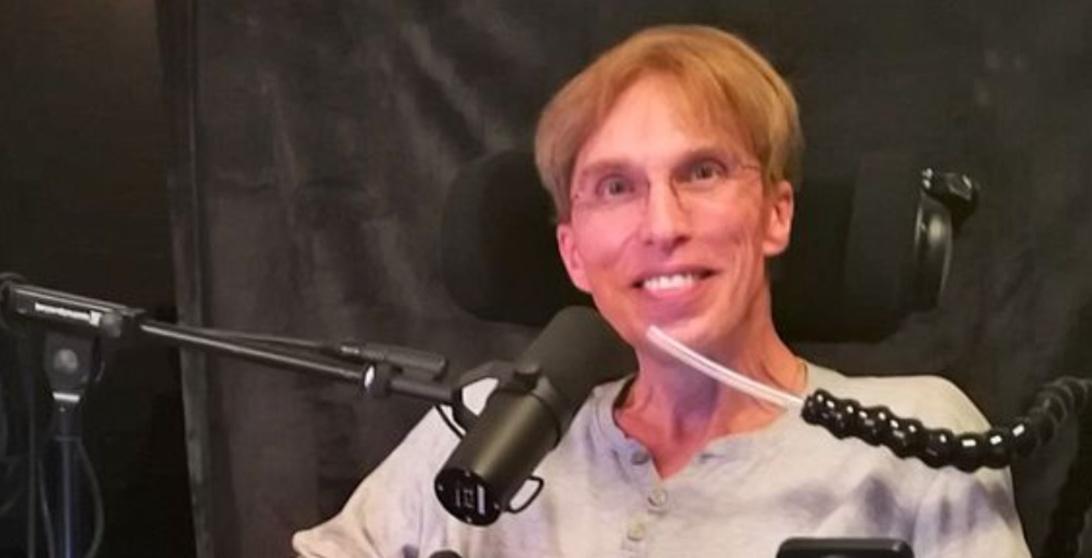“World’s First Cyborg” Dies At 64

A British scientist who became the ‘world’s first full cyborg’ has passed away at the age of 64.
Peter Scott-Morgan decided to challenge what it meant to be human when he refused to accept his fate following a diagnosis of motor neurone disease in 2017.
He said he wanted to push the boundaries of what science can achieve so decided to extend his life and become fully robotic.
His family confirmed the news of his passing on his Twitter account this morning.
‘To Peter’s amazing rebel supporters: With a broken heart, I’m letting you all know that Peter passed peacefully surrounded by his family, and those closest to him,’ they wrote.
‘He was incredibly proud of all of you who supported him, and his vision of changing the way people see disability.’
The world-renowned roboticist underwent a series of incredibly complex and risky operations and procedures during his journey to become a cyborg.
This included developing a remarkably life-like avatar before he lost any of the muscles in his face used to create expressions.
The avatar was designed to respond using artificially intelligent body language.
‘The animated movements are performed on a digital talking head generated from a scan of Dr. Peter Scott Morgan’s own head,’ explained Embody Digital, who developed the avatar.
Dr Scott-Morgan also explored the use of eye-tracking technology to enable him to control multiple computers using only his eyes.
Dr Scott-Morgan’s condition began deteriorating earlier this year, when his eyes stopped closing as a result of his MND.
‘YOU MAY WONDER WHY I have been so quiet for 2 months. Unusually for MND my eyes have stopped closing which makes them so dry that my eye-tracking stopped working!’ he tweeted in April.
The final procedure in his robot transition in 2019 saw him successfully trade his voice.
He underwent a laryngectomy, meaning he lost his physical voice, but in doing so, he avoided the added danger of saliva potentially entering his lungs, due to his condition.
Dr Scott-Morgan had previously labelled this treatment as the end of Peter 1.0 and the start of Peter 2.0.
He confirmed his laryngectomy on Twitter, writing: ‘Just home from 24 days in Intensive Care.
‘All medical procedures now complete and a huge success. My mini-ventilator keeping me breathing is a LOT quieter than Darth Vader’s.’
‘All speech is synthetic but at last sounds like me again. Long research road ahead but in great spirits.’
Speaking of his transition on his website, he said: ‘When I say ‘Peter 2.0’, I mean ‘a Cyborg’.
‘And when I say “Cyborg”, I don’t just mean any old cyborg, you understand, but by far the most advanced human cybernetic organism ever created in 13.8 billion years.
‘I’m scheduled to become the world’s very first full Cyborg.
‘Almost everything about me is going to be irreversibly changed – body and brain.
‘It goes without saying that all my physical interaction with the world will become robotic. And naturally, my existing five senses are going to be enhanced. But far more importantly, part of my brain, and all of my external persona, will soon be electronic – totally synthetic.
‘From then on, I’ll be part hardware / part wetware, part digital / part analogue.
‘And it won’t stop there; I’ve got more upgrades in progress than Microsoft. Mine isn’t just a version change. It’s a metamorphosis.’
The scientist also explored the use of eye-tracking technology, to enable him to control multiple computers using just his eyes.
In addition, he also had a remarkable top-end wheelchair, which he said on Twitter was ‘brilliantly engineered’ and allowed him to stand, lie flat and go fast.
He underwent further pioneering surgery in what he believed to be the first ever operation of its kind, to insert a feeding tube directly into his stomach, a catheter directly into his bladder and a colostomy bag directly onto his colon.
These procedures helped him to deal with any potential feeding and toileting problems, helping him to maintain his independence.
Despite the risks of operations and being terminally ill, Dr Scott-Morgan said he was not interested in how to survive his condition, and instead intended to ‘thrive.’
He remained positive and often humorous, seeing his situation as a chance to truly embrace scientific capabilities.
The Scott-Morgan Foundation which he set up with his husband, Francis, seeks to use artificial intelligence, robotics and other high-technology systems to transform the lives of those ‘restricted by age, ill-health, disability, or other physical or mental disadvantage.’
On his website Dr Scott-Morgan said this vision is far from just a dream.
He wrote: ‘We are within touching distance of changing – everything. I’m not dying – I’m transforming!
‘This is terminal disease like you’ve never seen it before. And as far as I’m concerned, bring it on.
‘MND hasn’t even begun to bring me to my knees. And even long after I’m locked In, I will still be standing tall.’
Source: Daily Mail








